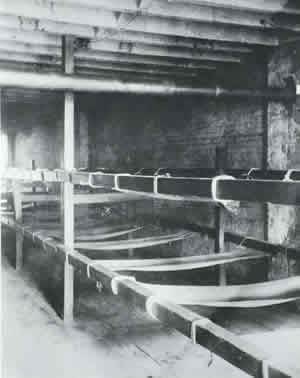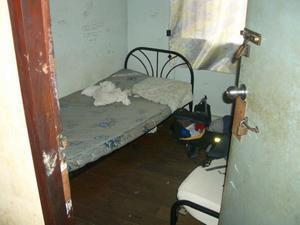Flop House on:
[Wikipedia]
[Google]
[Amazon]
 A flophouse (
A flophouse (
 Some city districts with flophouses in abundance became well known in their own right, such as the Bowery in Manhattan, New York City. Since the middle 20th century, reforms there have gradually made flophouses scarcer. The resulting gentrification and higher real-estate value has further eroded the ability of flophouses and inexpensive boarding-style hotels to make a profit.
Some city districts with flophouses in abundance became well known in their own right, such as the Bowery in Manhattan, New York City. Since the middle 20th century, reforms there have gradually made flophouses scarcer. The resulting gentrification and higher real-estate value has further eroded the ability of flophouses and inexpensive boarding-style hotels to make a profit.
 A flophouse (
A flophouse (American English
American English, sometimes called United States English or U.S. English, is the set of variety (linguistics), varieties of the English language native to the United States. English is the Languages of the United States, most widely spoken lan ...
) or dosshouse ( British English) is a place that offers very low-cost lodging
Lodging refers to the use of a short-term dwelling, usually by renting the living space or sometimes through some other arrangement. People who travel and stay away from home for more than a day need lodging for sleep, rest, food, safety, shel ...
, providing space to sleep and minimal amenities
In property and land use planning, amenity (lat. ''amoenitās'' “pleasantness, delightfulness”) is something considered to benefit a location, contribute to its enjoyment, and thereby increase its value.
Tangible amenities can include the ...
.
Characteristics
Historically, flophouses, or British "doss-houses", have been used for overnight lodging by those who needed the lowest cost alternative to staying with others, shelters, or sleeping outside. Generally rooms are small, bathrooms are shared, and bedding is minimal, sometimes with mattresses or mats on the floor, or canvas sheets stretched between two horizontal beams creating a series of hammock-like beds. People who make use of these places have often been calledtransients
Transience or transient may refer to:
Music
* ''Transient'' (album), a 2004 album by Gaelle
* ''Transience'' (Steven Wilson album), 2015
* Transience (Wreckless Eric album)
Science and engineering
* Transient state, when a process variable or ...
and have been between homes. Quarters are typically very small, and may resemble office cubicles more than a regular room in a hotel or apartment building. Some flophouses qualify as boarding houses, but only if they offer meals.
American flophouses date at least to the 19th century, but the term '' flophouse'' itself is only attested from around the early 1900s, originating in hobo
A hobo is a migrant worker in the United States. Hoboes, tramps and bums are generally regarded as related, but distinct: a hobo travels and is willing to work; a tramp travels, but avoids work if possible; and a bum neither travels nor works.
E ...
slang. In the past, flophouses were sometimes called ''lodging houses'' or ''workingmen's hotels'' and catered to hobo
A hobo is a migrant worker in the United States. Hoboes, tramps and bums are generally regarded as related, but distinct: a hobo travels and is willing to work; a tramp travels, but avoids work if possible; and a bum neither travels nor works.
E ...
s and transient workers such as seasonal railroad and agriculture workers, or migrant lumberjacks
Lumberjacks are mostly North American workers in the logging industry who perform the initial harvesting and transport of trees for ultimate processing into forest products. The term usually refers to loggers in the era (before 1945 in the Uni ...
who would travel west during the summer to work and then return to an eastern or midwestern city which ran along the rail lines, such as Chicago, to stay in a flophouse during the winter. This is described in the 1930
Events
January
* January 15 – The Moon moves into its nearest point to Earth, called perigee, at the same time as its fullest phase of the Lunar Cycle. This is the closest moon distance at in recent history, and the next one will be ...
novel ''The Rambling Kid'' by Charles Ashleigh and the 1976
Events January
* January 3 – The International Covenant on Economic, Social and Cultural Rights enters into force.
* January 5 – The Pol Pot regime proclaims a new constitution for Democratic Kampuchea.
* January 11 – The 1976 Phila ...
book ''The Human Cougar'' by Lloyd Morain
Lloyd L. Morain (2 April 1917 – 13 July 2010) was an American businessman, philanthropist, writer, environmentalist, art collector and film producer, who uniquely served two terms as President of the American Humanist Association (AHA).
Life an ...
. Another theme in Morain's book is the gentrification which was then beginning and which has led cities to pressure flophouses to close.
 Some city districts with flophouses in abundance became well known in their own right, such as the Bowery in Manhattan, New York City. Since the middle 20th century, reforms there have gradually made flophouses scarcer. The resulting gentrification and higher real-estate value has further eroded the ability of flophouses and inexpensive boarding-style hotels to make a profit.
Some city districts with flophouses in abundance became well known in their own right, such as the Bowery in Manhattan, New York City. Since the middle 20th century, reforms there have gradually made flophouses scarcer. The resulting gentrification and higher real-estate value has further eroded the ability of flophouses and inexpensive boarding-style hotels to make a profit.
21st-century revival
In the 2010s, the high cost of housing in cities such as San Francisco has seen an increase in the number of flophouses. The modern flophouses, sometimes branded as "pods", usually have partitions between beds for privacy, and are created from existing houses or apartments. They are often marketed toward commuters who stay in the city during the workweek.Cage homes in Hong Kong
Cage home
A bedspace apartment (), also called cage home (), coffin cubicle, or coffin home, is a type of Residential area, residence that is only large enough for one bunk bed surrounded by a metal cage. This type of Residential area, residence originated ...
s were built in Hong Kong in the 1950s for single working men from Mainland China. Cage homes are described as " wire mesh cages resembling rabbit hutches crammed into a dilapidated apartment." As of 2012, the number of impoverished residents in Hong Kong was estimated at 1.19 million, and cage homes, along with substandard housing such as cubicle apartments, were still serving a portion of this sector's housing needs. The combination of high rents and income inequality has been given as one reason that cage homes persist.
Michael Adorjan, a University of Hong Kong criminology
Criminology (from Latin , "accusation", and Ancient Greek , ''-logia'', from λόγος ''logos'' meaning: "word, reason") is the study of crime and deviant behaviour. Criminology is an interdisciplinary field in both the behavioural and so ...
professor, has noted that "The United Nations has called cage and cubicle homes an 'insult to human dignity.'"
Cage hotels in the United States
Cage hotels, a form of single room occupancy, were common in Chicago at the turn of the 20th century; an estimated 40,000 to 60,000 people lived in them during the winter. A 1958 survey byChristopher Jencks
Christopher Sandy Jencks (born October 22, 1936) is an American social scientist.
Career
Jencks is currently the Malcolm Wiener Professor of Social Policy in the Kennedy School of Government at Harvard University. He graduated from Phillips E ...
found that homeless men preferred cage hotels over shelters for reasons of privacy and security.
A similar preference for cage hotels over shelters was reported in turn of the century New York City, where single working men ranked their housing preference in the following order:
"Regulatory efforts to combat low-cost 'cage hotels,' ... as been
As, AS, A. S., A/S or similar may refer to:
Art, entertainment, and media
* A. S. Byatt (born 1936), English critic, novelist, poet and short story writer
* "As" (song), by Stevie Wonder
* , a Spanish sports newspaper
* , an academic male voic ...
a driver of the expansion of the homeless population in US cities", according to Jencks. By 2021, only one, the Ewing Annex Hotel, remained in Chicago, housing some 200 men, many of whom would otherwise be homeless.
See also
* Capsule hotel * Common lodging-house *Hostel
A hostel is a form of low-cost, short-term shared sociable lodging where guests can rent a bed, usually a bunk bed in a dormitory, with shared use of a lounge and sometimes a kitchen. Rooms can be mixed or single-sex and have private or shared b ...
* Internet café
* Punk house
* '' Staying Alive''
References
Further reading
*{{Cite book , publisher = M. Jones Co. , last = Jesse Walter Dees , title = Flophouse; an authentic undercover study of flophouses, cage hotels, including missions, shelters and institutions serving unattached (homeless) men. A sociological study that includes English origins of mass relief, samples of American mass relief and a modern investigation of public and private policies in Chicago. , location = Francestown, New Hampshire , date = 1948 , oclc = 494608 Homelessness Hotel types Urban decay